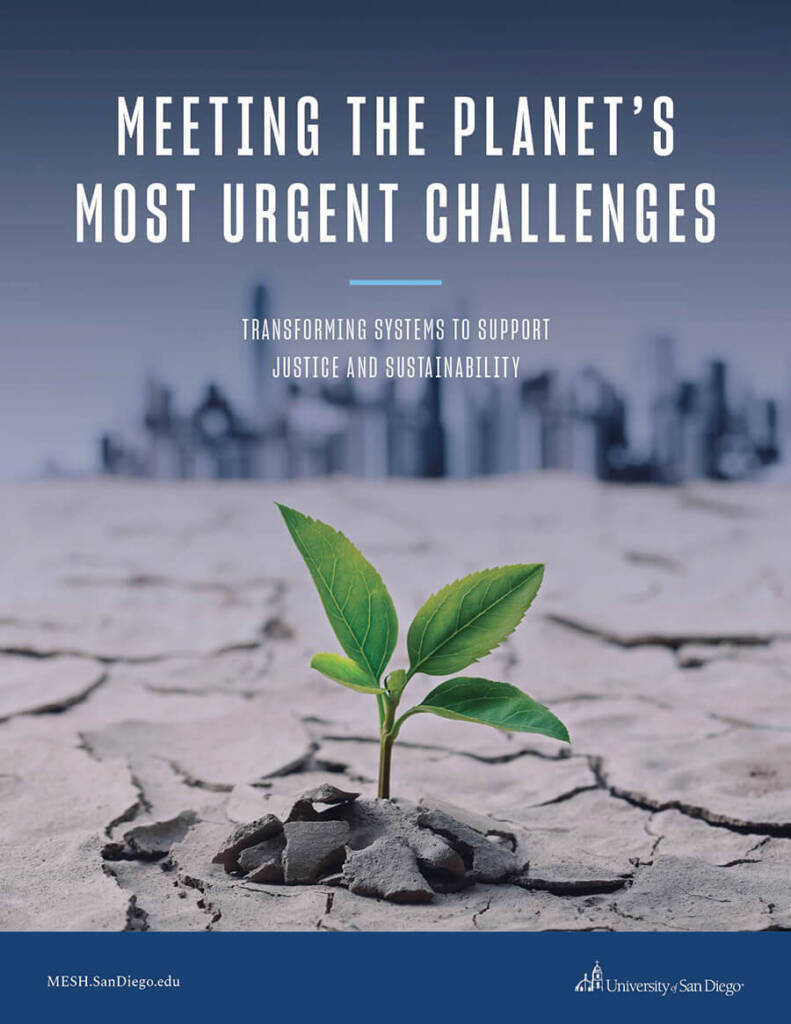We’ve written before about how there has never been a more important time to consider a career in sustainability. With the steady push from governments, businesses and other organizations to meet the challenges of sustainable development, there are multiple career paths across almost every industry dedicated to the just pursuit of economic growth, social inclusion and environmental protection.
As the job market for sustainability positions has grown, educational programs across the fields of science and engineering, social science and the humanities have developed to meet increased demand. It’s now possible to find sustainability specialties or even full degrees in disciplines as diverse as business, health, law, engineering, environmental sciences, communication, environmental studies and biology.
Master’s degrees, in particular, can offer students an opportunity to develop specialized knowledge and experience within a particular field. Some graduate programs are designed to provide an interdisciplinary space where connected areas of study can come together to discuss the intersection of environmental, social/cultural and economic systems related to sustainability.
Not only does a master’s degree provide an edge for advancing to leadership roles within a company or organization, some positions — especially at the senior or executive level — prefer advanced degrees. Moreover, as job opportunities in sustainability expand, so do the expectations and the competition. Today’s students can benefit from general studies in sustainability, where their peers can provide a deep understanding of related matters such as economical justice, renewable energy resources, climate crisis response, sustainable supply chains or women’s empowerment.
If you’re considering how to take action for a more sustainable future, then here are some of the major areas of study, plus a sample of different master’s degree programs in the U.S.
Types of Master’s Degrees in Sustainability
Like most master’s degree programs, a program in sustainability studies is typically a one to two year study of advanced topics designed to give you specialized knowledge for a specific field. When researching an area of study, consider whether you want to participate in a specific sustainability-focused program or if you’d be more comfortable with a general program that has sustainability coursework built into it.
For your consideration, here’s a list of five of the more popular areas of study for a master’s in sustainability degree, ranging from engineering to law to health studies — along with sample careers and salary estimates.
- Environmental Science — Whether you’re hoping to protect endangered ecosystems or want to find ways to regenerate our natural resources, environmental science is a great fit if you’re passionate about the natural world. Master of science degrees in environmental science train students how to practice environmental science field methods, conduct analyses and report findings in the hope of preventing, controlling or fixing environmental challenges.
Environmental science programs require a bachelor’s degree in a science or engineering field, and applicants may have to meet specific course requirements. This is a highly technical degree with coursework that can include biology, chemistry, hydrology and environmental regulation and management.
| Sample Master’s Degree Programs | School | Credit Hours | Sample Courses |
| M.S. in Land Resources and Environmental Sciences | Montana State University | 30 | Wetland Ecology and Management, Environmental Data Analysis, Natural Resource Law |
| M.S. in Ecology and Conservation Biology | Texas A&M University | 32 | Changing Natural Resource Policy, Wildland Watershed Management, Environmental Impact Analysis for Renewable Natural Resources |
| M.S. in Environmental Science and Policy | George Mason University | 33 | Urban Ecosystems Processes, Perspectives on Food Security, Conservation Medicine |
| Possible Career Paths | Average Median Salary | Responsibilities |
| Ecologist | $63,000 | Measures impact of industrialization, pollution and conservation on organisms, habitats and environmental conditions. |
| Conservation Scientist | $63,750 | Studies land used for agriculture to develop means of controlling erosion, preserving water supplies and otherwise safeguarding the environment. |
- Health and Human Development — Should you be interested in working in human services, then there’s never been a greater need for action in health and human development. The 2020 global pandemic stretched many health systems to the breaking point, and the risks of conflicts, disasters and future pandemics endanger our most vulnerable populations. Students in health and human development programs study the environmental and human factors impacting health, developing the skills to work in healthcare, social services or crisis response.
Health and human development programs will require a background in at least the basic sciences, and some may require specific courses in biology or the health care fields. Applicants may also be asked to apply through the Schools of Public Health Application Service. These programs often offer concentrations in areas such as environmental health, psychology, biology, environmental chemistry and healthcare technology.
| Sample Master’s Degree Program | School | Credit Hours | Sample Courses |
| MPH in Environmental Health Sciences | University of Massachusetts at Amherst | 42 | Environmental Health Practices, Air Quality Assessment, Institutional Hygiene and Sanitation |
| MS Concentration in Environmental and Occupational Health Sciences | University of Illinois at Chicago | 48 | Ethics and Justice in Environmental and Occupational Health, Biostatistics, Injury Epidemiology and Prevention |
| Possible Career Paths | Average Median Salary | Responsibilities |
| Environmental Health Specialists | $76,530 | Studies how environmental factors affect human health and investigate potential health risks to minimize impacts and improve both public and environmental health. |
| Environmental Health and Safety Analyst | $94,000 | Inspects facilities and supervises practices to ensure that all health, safety and environmental procedures are followed and hazardous materials are handled appropriately. |
- Sustainable Engineering — Those interested in exploring human-built solutions to our most pressing challenges can study how to apply sustainable principles to engineering. From electrical and mechanical engineering to civil and environmental, the future of engineering lies in training today’s students how to protect and improve human and environmental health.
Sustainable engineering programs will require a bachelor’s degree in engineering or related fields of science, mathematics or computer science. These are highly technical programs where students will supplement their general science and engineering coursework with studies in specific areas like ethics, waste and pollution, environmental restoration and leadership.
| Sample Master’s Degree Program | School | Credit Hours | Sample Courses |
| M.S. in Earth and Environmental Engineering | Columbia University | 30 | Environmental Microbiology, Management and Development of Water Systems, Environmental Engineering |
| M.E. in Energy Systems Engineering | University of Michigan | 30 | Sustainable Energy Systems, Energy Generation and Storage Using Modern Materials, Global Engineering Leadership |
| M.S. in Environmental Engineering | Syracuse University | 30 | Environmental Chemistry and Analysis, Applied Environmental Microbiology, Hydrogeology |
| Possible Career Paths | Average Median Salary | Responsibilities |
| Environmental Engineer | $96,820 | Draws upon principles of engineering to address issues relating to recycling, waste disposal, public health and water and air pollution. |
| Civil Engineer | $88,050 | Work in the public and private sector to plan, design and construct infrastructure projects, including roads, water treatment, dams and bridges. |
| Chemical Engineer | $85,000 | Researches, designs and develops processes and equipment for the manufacturing and testing of chemicals, fuels, pharmaceuticals and other products. |
- Environmental and Social Justice Law — Legal protections are essential for shielding the weak from the powerful, for establishing laws and regulations and to advance public policy that is fair and just. Students who seek one of these advanced legal degrees can choose to study legal matters relating to environmental justice, sustainable growth, international trade, corporate law, pollution control and social justice.
Though applicants for environmental or social justice legal programs don’t have to be actively practicing law, they will need a Juris Doctor (JD), LL.B or equivalent bachelor’s degree from either an ABA-approved U.S. law school or a similarly recognized law school.
| Sample Master’s Degree Program | School | Credit Hours | Sample Courses |
| Master of Legal Studies: Law and Sustainability | Arizona State University | 30 | Energy Law and Policy, Environmental Law, Land Use Regulation |
| LLM in Environmental and Energy Law | University of San Diego | 24 | Climate Change Law & Policy, Public Interest Law Clinic, Administrative Law |
| Possible Career Paths | Average Median Salary | Responsibilities |
| Environmental Lawyer | $69,314 | Represents clients in environmental legal issues, including water law, climate change law and land management. |
| Social Compliance Specialist | $62,000 | Ensures that organizations operate in full compliance with laws, regulations, practices and standards meant to promote social good and sustainability |
- Sustainability in Management — Corporations are often positioned as the antithesis to sustainable practices, but all businesses will need to embrace sustainable development if we have any hope of meeting our future sustainability goals. No matter if you’re hoping to implement sustainable practices in an established business or want to create a start-up business that revolutionizes an industry, sustainability has a place in every organization, from marketing to finance to product development.
Sustainability management programs are open to students from a variety of degree programs, provided they’re from an accredited institution. Generally business-related degrees such as economics, mathematics, organizational management and communication are preferred. Previous professional experience is also helpful. Students who study sustainable business topics will review areas such as impact investing, environmental, social and governance (ESG) criteria, corporate governance, ethics and international economics.
| Sample Master’s Degree Program | School | Credit Hours | Sample Courses |
| M.S. in Sustainable Management | University of Wisconsin | 34 | The Built Environment, Economics of Sustainability, Corporate Social Responsibility |
| MBA with a Concentration in Sustainability | Wilmington University | 36 | Global Marketing Management, Strategic Planning for Sustainability, Principles of Business Sustainability |
| MBA in Energy & Sustainability Studies | Franklin Pierce University | 39 | Energy Economics, Building a Sustainable Enterprise, Organizational Behavior |
| Possible Career Paths | Average Median Salary | Responsibilities |
| Chief Sustainability Officer | $95,516 | Oversees the sustainability goals, strategies, policies and initiatives of an organization and determines how sustainability can be realized across departments. |
| Sustainability Consultant | $71,000 | Consults with organizations to identify areas to improve efficiency and waste management in a cost effective and socially responsible manner. |
A Transdisciplinary Approach to Sustainability Degrees
These five areas aren’t the only options for study; if you’re committed to another field such as communication or fine arts, you can find many programs that offer sustainability studies as a concentration or even a full degree. However, many of these degree programs focus largely on specific areas, and rarely account for the diversity of backgrounds, expertise, institutional knowledge and other factors that shape how we can address our most pressing environmental concerns.
If you’re hoping to look beyond traditional academic silos for more holistic approaches to how to take action, then consider a transdisciplinary program like the University of San Diego’s Master of Science in Engineering for Sustainability and Health (MESH) degree. MESH’s transdisciplinary approach is designed to challenge the preconceived notions of these siloed fields by bringing together and empowering students from across disciplines to learn from, question and improve upon current practices.
Whether you are located in the US or an international student, MESH is designed as a supportive and innovative space for students from any discipline who want to meet the pressing global challenges of inequity, poverty, natural disasters and climate change. This transdisciplinary degree brings together professionals from multiple disciplines and backgrounds . The program welcomes students from any background — science, engineering, public development, political science and social justice disciplines — who wants to take action in pursuing sustainable development that is just and equitable




